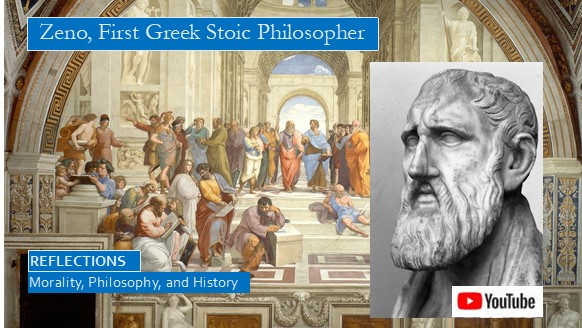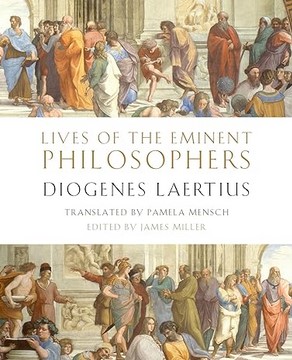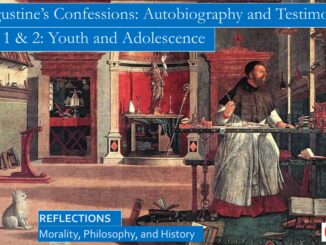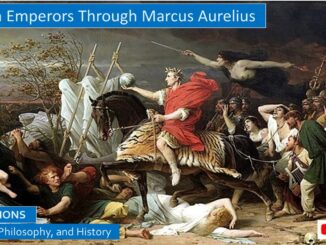
When we study ancient history, often we are frustrated by the paucity or under-abundance of ancient primary sources. Sometimes all we have is one problematic source for important people and events in ancient history. Such is the case for the Greek founder of Stoicism, Zeno of Citium, in the third century BC.
The only primary source, other than scattered fragments, for the Greek Stoic philosophers is Diogenes Laertius, “Lives of the Eminent Philosophers.” Many of the philosophers he discusses are only known through Diogenes, and the works of many others, like Zeno and the other Stoic philosophers in Book 7, must be sampled through the summaries of their views by Diogenes. We know for sure that the main works of Zeno were studied by the Romans, as Seneca explicitly mentions studying the works of Zeno.
You can view our YouTube Video at: https://youtu.be/STxpGlkFyvs
If we want to learn more than his summaries, Diogenes provides us long lists of the works written by each of these Stoic philosophers. Unfortunately, all of these works, save a few fragments found or quoted, are all lost in the sands of history. Many of the fragments quoted can be found at https://www.stoictherapy.com/resources-fragments , sometime later I will try to purchase some of these works and comment on the work as a whole.
Maybe some freezing monks used the pages of Stoic philosophers to kindle their winter fires. There is a certain randomness in what ancients works survived and which did not. We can assume that the ancient and medieval copyists generally found the works of the later Roman Stoics to be more profitable reading than the works of Zeno and the Greek Stoics. Also, from Diogenes we can infer that the later Greek Stoics were slavishly copying Zeno’s philosophical ideas.
Diogenes quotes a humorous comment of a critic of the Stoic philosopher Chrysippus, who wrote over 700 works, his main works spanning many pages in the Lives by Diogenes: “If one were to remove all extraneous citations from Chrysippus’ books, there would be nothing left but blank pages.”[1] Perhaps only a few copies were made of many of the Stoic books, perhaps some of them were only available in the original in Athens.
Diogenes first draws a short biography of each philosopher. As a young student, Zeno consulted an oracle on what “he should do to live the best life, and the oracle replied that he should have intercourse with the dead Grasping the oracle’s meaning, he read the works of the ancients.”[2]
Zeno came to Athens after he was shipwrecked, where he studied philosophy under the Cynic Crates and then other philosophers. He gave his philosophical lectures while walking in the Painted Stoa, a covered walkway in the agora of Athens. One of his main works was the Republic, this may have been in part a commentary on Plato’s Republic based on some comments by Diogenes. The Athenians held him in such high regard that he was given the keys to the city walls.[3] Zeno was extremely frugal. “If he rebuked anyone, he did so tersely, without elaborating.[4] Zeno may have been the first philosopher to remind us that “the reason we have two ears and one mouth is so we may hear more and talk less.”[5]
When you read the Roman stoic philosophers you realize that Stoic philosophy is primarily a moral philosophy, a philosophy that cares deeply on teaching you to live a virtuous and godly life, and that they care very little about epistemology. There is very little if any discussion of epistemology by Epictetus, Rufus, or Marcus Aurelius, and out of over a hundred letters Seneca does have a brief discussion of Plato’s epistemology.
Although moral philosophy was very important to Zeno and the other Greek Stoic philosophers, Diogenes infers that they were more eclectic. According to Diogenes, Zeno described the three parts of philosophy as the physical, the ethical, and the logical, and that these parts should be blended rather than separated. Diogenes spends about ten pages discussing the physical or scientific philosophy of the Greek Stoics, which does not interest us. Other stoics had similar categories, Cleanthes said philosophy has six parts, dialectic, rhetoric, ethics, politics, physics, and theology.[6] Diogenes then discusses for many pages the Stoic teachings on logic and language, similar to what Aristotle taught. However, judging from the titles of their lost works, the Greek Stoics were primarily interested in moral philosophy.
MORAL PHILOSPHY OF THE GREEK STOICS
Zeno’s Stoic teachings on the nature of God remind us of the are similar to the teachings of the later Roman Stoics. Zeno speculates that “God is a living being, immortal, rational, perfect in happiness, immune to anything evil, exercising forethought for the cosmos and all it contains. But he is not of human shape. He is the craftsman of all things, both generally and in that particular part of him that pervades everything, and which is called by many names in accordance with all his various powers.” “The whole cosmos and the heaven are the substance of God.” Zeno mainly identifies God with Zeus as the cause of life and all things, but that each of the other gods are a manifestation of his other aspects.[7] If you prefer to describe Zeno’s beliefs as henotheistic, it is a henotheism that is close to monotheism.
In the section on moral philosophy sometimes Diogenes credits the teachings to Zeno, sometimes to other Stoic philosophers, sometimes the attribution is unclear. Since the works are lost anyway, and since we care more about the teachings than the attributions, we do not need to be careful in our attributions. Often Diogenes repeats these moral teachings without adequate explanation of their meaning.
“Virtue is a harmonious disposition, and should be chosen for its own sake, not out of fear or hope of anything external. Happiness lies in virtue, since virtue is the state of mind that makes the whole of life harmonious.”[8]
Like the Roman Stoics and Eastern Church Fathers, the Greek Stoics make lists of the virtues and vices. The Greek Stoics also emphasize the need to develop good habits with self-discipline and avoidance of hedonistic pleasures.
The primary virtues listed by the Greek Stoics are wisdom, courage, justice and temperance. Unfortunately, the definitions of these virtues in Diogenes either don’t make sense or are missing. “Species of these virtues include magnanimity, self-control, endurance, quick-wittedness, and good counsel.” Magnanimity is the knowledge or habit that allows you to rise above whatever happens, good or bad. Self-control is a disposition that is not easily overpowered, nor is it compromised by pleasures.[9]
The primary vices listed by the Greek Stoics are folly, cowardice, injustice, and intemperance. Subordinate to these are the lack of self-control, slow-wittedness, and ill-advisedness. Vices are ignorant of the wisdom bestowed by the virtues.
Passions must be checked and controlled. The most dominant passions are pain, fear, desire, and pleasure. Pain is irrational, “the species of pain are pity, envy, jealousy, rivalry, heavyheartedness, annoyance, chagrin, anguish, and confusion.” Diogenes lists the pains: “pity is a pain felt for someone whose suffering is undeserved, envy a pain felt when others have good things, jealousy a pain felt when others have what we want,” rivalry a pain felt when our neighbor’s toys are better than ours, “heavy-heartedness is a pain that weighs us down, chagrin a lingering and intensifying pain made worse by brooding, anguish a pain that saps our energy, and confusion an irrational, gnawing pain” that keeps us from knowing where we are.
“The forms of fear include terror, shrinking, shame, shock, panic, and dread.” “Desire is an irrational yearning. These yearnings include craving, hatred, contentiousness, anger, erotic passion, wrath, and temper.” Most interesting is his description of wrath, which is a “long simmering and vengeful anger that awaits is opportunity. Temper is anger at an early stage.”
Pleasure is the high we feel when we gain the object of our desires. The types of pleasure are “enchantment, spite, delight, and rapture. Enchantment is pleasure that charms the ear; spite is pleasure at another’s misfortunes, and rapture is a dissolving of virtue.”[10]
The Greek Stoics’ description of the good man foreshadows the teachings of the Roman Stoics and the Eastern Church Fathers. “The good are divine, for they have in themselves a kind of divinity.” The good man is god-fearing, while the base man is godless. “Piety is knowledge of how to serve the gods.” Not only do the good sacrifice to the gods, they also keep themselves pure when they avoid offending the gods.
“The good aim genuinely and vigilantly for their own improvement by making a practice of concealing base things and bringing to light whatever is good. They are unpretentious.” “They are not overly busy, for they avoid doing anything that is contrary to duty. They will drink in moderation but will never get drunk.” Like the Roman Stoics, the Greeks do not view grief as a virtue. “The wise man will not be afflicted by grief, since grief is an irrational contraction of the soul.”[11]
Diogenes mentions briefly aspects of the good man that the Roman Stoics flesh out. Epictetus will elaborate this thought, “the good man alone is a free man, whereas the base man is a slave.” “The wise are not only free, but are also kings.” “The wise man will pray ask for good things from the gods,” not just health and wealth, but also virtue and wisdom. “Friendship exists only among the good,”[12] and the Roman Stoics will write many chapters on friendship.
WHY ARE ALL OF ZENO’S WORKS LOST?
In the appendix the leading scholar AA Long discusses Diogenes’ book on Zeno. He comments that Zeno did not really write that much, as many of his listed works may have been short and pithy. Perhaps something he read gave him that impression, but I do know Seneca mentions that he studied the works of Zeno.
AA Long points out that many early stoics were embarrassed by the libertine comments of Zeno. He points out that his utopian society described in his book Republic is more extreme than Plato’s Republic. As AA Long tells us, in Zeno’s Republic “the nuclear family would be prohibited. Sexual relations would be based simply on mutual consent. Unisex clothing and partial nudity would be required of everyone. Ethical goodness would be the only criterion for citizenship, freedom, and friendship. From elsewhere we know that Zeno also challenged sexual taboos by permitting incest, recommending virtuous teachers to practice bisexual pedophilia, and elevating Eros” to that of a divinity.[13]
Diogenes in one section suggests that Zeno criticized pederasty,[14] but in another section he says that Zeno only procured young boys on rare occasions, but sometimes he preferred young girls so as not to be too much of a misogynist (yes, he said that).[15] Some of this stuff was repeated by his successor Chrysippus[16]
Whereas the Platonic dialogues often described homosexual flirting, the works of Zeno and the other Greek Stoics appear to be much racier. Perhaps while the medieval monks were okay with copying and transmitting the dialogues of Plato, perhaps they balked at copying and transmitting the works of Zeno, preferring to use the old leaflets to start their cooking fires.
[1] Diogenes, “Lives of Eminent Philosophers,” translated by Pamela Mensch, (New York: Oxford University Press, 2018), Book on Zeno and other Stoics, Book 7: 147-148, p. 364.
[2] Diogenes, “Lives of Eminent Philosophers,” on Zeno and other Stoics, Book 7: 2, p. 312.
[3] Diogenes, “Lives of Eminent Philosophers,” on Zeno and other Stoics, Book 7: 5-6, p. 314.
[4] Diogenes, “Lives of Eminent Philosophers,” on Zeno and other Stoics, Book 7: 15, p. 319.
[5] Diogenes, “Lives of Eminent Philosophers,” on Zeno and other Stoics, Book 7: 23, p. 322.
[6] Diogenes, “Lives of Eminent Philosophers,” on Zeno and other Stoics, Book 7: 39, pp. 328-329.
[7] Diogenes, “Lives of Eminent Philosophers,” on Zeno and other Stoics, Book 7: 181, p. 380.
[8] Diogenes, “Lives of Eminent Philosophers,” on Zeno and other Stoics, Book 7: 89, p. 344.
[9] Diogenes, “Lives of Eminent Philosophers,” on Zeno and other Stoics, Book 7: 92-93, p. 346.
[10] Diogenes, “Lives of Eminent Philosophers,” on Zeno and other Stoics, Book 7: 111-114, pp. 351-352.
[11] Diogenes, “Lives of Eminent Philosophers,” on Zeno and other Stoics, Book 7: 118-119, p. 353.
[12] Diogenes, “Lives of Eminent Philosophers,” on Zeno and other Stoics, Book 7: 122, 124, pp. 354-355.
[13] Diogenes, “Lives of Eminent Philosophers,” essay in Appendix, AA Long, “Zeno of Citium: Cynic Founder of the Stoic Tradition, pp. 603-607, also Book 7: 33-34, pp.326-327.
[14] Diogenes, “Lives of Eminent Philosophers,” on Zeno and other Stoics, Book 7: 18, p. 320.
[15] Diogenes, “Lives of Eminent Philosophers,” on Zeno and other Stoics, Book 7: 13, p. 318.
[16] Diogenes, “Lives of Eminent Philosophers,” on Zeno and other Stoics, Book 7: 189, p. 383.





4 Trackbacks / Pingbacks